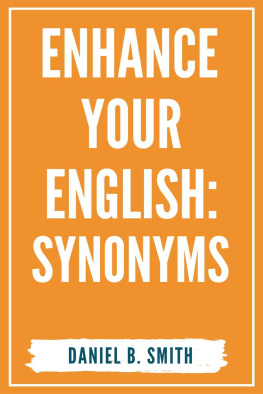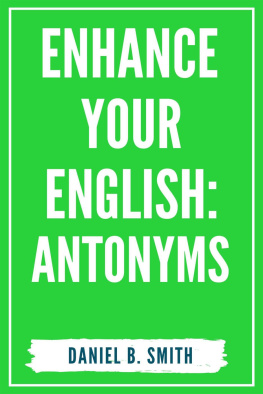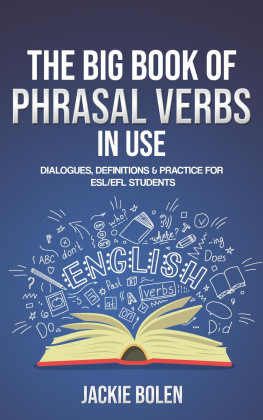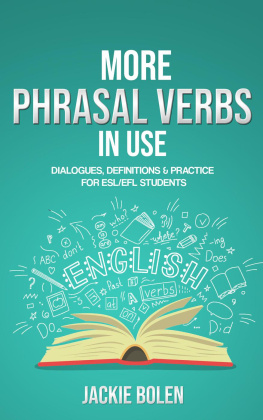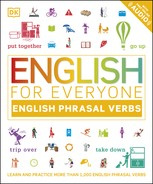The main objective of this book is to provide you an impressive and invaluable collection of most used English phrasal verbs with example sentences also included, so as to learn how to properly use them. Phrasal verbs are verbs that consist of a verb and a particle (a preposition or adverb) or a verb and two particles (an adverb and a preposition, as in get on with or look forward to).
Phrasal verbs usually have a one-word equivalent. Learning the most used phrasal verbs will help you make your English sound more fluent and thus you will be able to communicate better. Phrasal verbs are extremely common in English. They are found in a wide variety of contexts. You may have noticed them in songs, in film titles or in newspaper headlines. It is important to remember that phrasal verbs are used when speaking informally and this book has more than 3,100 phrasal verbs for you to discover or rediscover.
English phrasal verbs beginning with A
1.abide by = Accept or follow a decision or rule. e.g. Steve has to abide by what the court says. 2.account for = To explain. e.g. 3.ache for = Want something or someone a lot. e.g. e.g.
My girlfriend has been away for a fortnight I am aching for her. 4.act on (I) = To take action because of something like information received. e.g. The police were acting on a tip and they finally caught the gang red-handed. 5.act on (II) = To affect. e.g.
The medicine only acts on infected tissue. 6.act out (I) = Perform something with actions and gestures. e.g. They acted out the story on stage, which was beautiful. 7.act out (II) = Express an emotion in your behaviour. e.g.
Their anger is acted out in their antisocial behaviour and you can easily notice this. 8.act up = Behave badly or strangely. e.g. My laptop is acting up; I think I might have a virus. 9.act upon (I) = To take action because of something like information received. e.g.
The army were acting upon a tip-off. 10.act upon (II) = Affect e.g. This enzyme acts upon certain proteins. 11.add on = Include a calculation. e.g. 12.add up (I) = To make a mathematical total. e.g. e.g.
They added up the bill to check if it was correct. 13.add up (II) = Be a satisfactory explanation for something. e.g. He explained why the project wasnt ready, but his story doesnt add up. 14.add up to (I) = Have a certain result. e.g.
Transportation delays are getting worse and with these enormous fares, it all adds up to misery for the commuters. 15.add up to (II) = Come to a certain amount or figure. e.g. The total costs of this project add up to several billion euros. 16.agree with = Affect usually used in the negative to show that something has had a negative effect, especially if it makes you feel bad. e.g.
I feel terrible that food didnt agree with my stomach. 17.aim at (I) = To target. e.g. The magazine is aimed at the retired. 18.aim at (II) = Intend to achieve. e.g.
Were aiming at reducing costs by five percent. 19.allow for = Include something in a plan or calculation. e.g. You should allow for risks when planning a mission. 20.allow of = Make possible, permit. e.g.
The rules dont allow of any exceptions. 21.angle for = Try to get something indirectly, by hinting or suggesting. e.g. He has been angling for an invitation, but I dont want him to come. 22.answer back = To reply rudely to someone in authority. e.g.
Her manager was shocked when she started answering him back. 23.answer for (I) = Be held responsible for a problem. e.g. The government should be made to answer for their mistakes. 24.answer for (II) = Speak on behalf of someone or from knowing them. e.g.
I can answer for my partner because I know his position on this matter. 25.argue down (I) = Beat someone in a debate, discussion or argument. e.g. The teacher tried to argue the girl down, but she couldnt. 26.argue down (II) = Persuade someone to drop the price of something theyre selling. e.g.
She argued him down fifteen percent. 27.argue down (III) = Try to persuade people not to accept a proposition, motion etc. e.g. They tried to argue down the proposal. 28.argue out = Argue about a problem to find a solution. e.g.
If we cant argue our differences out, well have to take them to court. 29.ask about = Ask how someone is doing, especially professionally and in terms of health. e.g. She asked about my father. 30.ask after = Enquire about someones health, how life is going. e.g.
She rang earlier and asked after you, so I told her you were quite fine. 31.ask around (I) = Ask a number of people for information of help. e.g. I have no idea, but Ill ask around at work. 32.ask around (II) = Invite someone. e.g.
I asked them around for dinner. 33.ask for (I) = To provoke a negative reaction. e.g. Youre really asking for trouble. 34.ask for (II) = Request to have or be given. e.g.
I asked for the menu, please. 35.ask in = To invite somebody into your house. e.g. Marry is at the door. Ask her in. e.g. e.g.
He wanted to ask her out but was too shy. 37.ask over = To invite. e.g. They have asked us over for drinks on Saturday. 38.ask round = To invite someone. e.g.
We asked Steve round for dinner. 39.auction off = Sell something in an auction. e.g. We auctioned off our property as we were heavily in debt.
English phrasal verbs beginning with B
40.back away = Retreat or go backwards. e.g.
They backed away when the man pulled a knife. 41.back down = Retract or withdraw your position or proposal in an argument. e.g. She refused to back down and was eventually fired. 42.back into = Enter a parking area in reverse gear. e.g.
She prefers to back her car into the garage. 43.back off = Retreat. e.g. The police told the protesters to back off. 44.back out = Fail to keep an arrangement or promise. e.g.
Marry backed out three days before the holiday so we gave the ticket to her sister. 45.back out of (I) = Fail to keep an agreement, arrangement. e.g. She backed out of the agreement at the very last minute. 46.back out of (II) = Exit a parking area in reverse gear. e.g.
He backed the BMW out of its parking space. 47.back up (I) = Make a copy of computer data. e.g. You should always back up important files so that you wont lose all your work if something goes wrong. 48.back up (II) = Support. e.g.
The rest of the staff backed her up when she complained about working conditions. 49.back up (III) = Drive a vehicle backwards. e.g. Tim backed up without looking and ran over his bicycle. 50.bag out = Criticise. e.g.
Dont bag out her decisions. They are good. 51.bail out (I) = Save, rescue. e.g. The government had to bail out the railway company because it was losing so much money. e.g. e.g.
My boat was leaking so I had to bail it out. 53.bail out (III) = Jump out of a plane because it is going to crash. e.g. The pilot and the passengers bailed out when they saw that engines had failed. 54.bail out of = Pay a bond to release someone from jail. e.g.
You should bail your brother out of jail. 55.bail out on = Stop supporting someone when they are in trouble. e.g. She bailed out on him when the scandal broke. 56.bail up (I) = Talk to someone and delay them. e.g.


